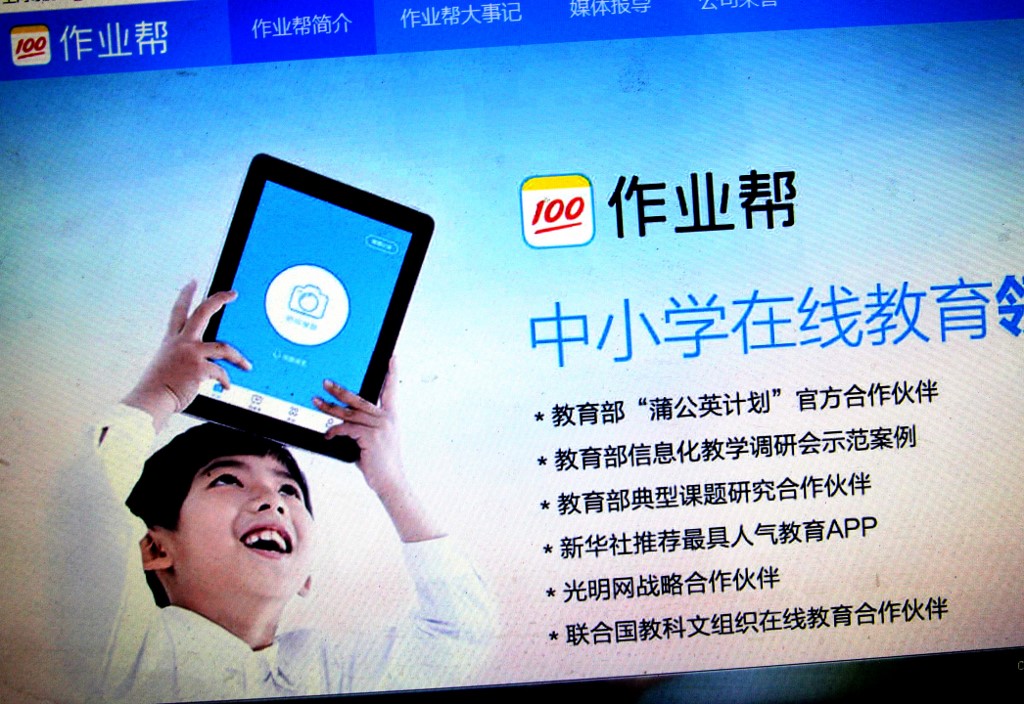• Policy shift restricts foreign access to lucrative education sector
• Shares of online platforms hammered in US, Hong Kong
China’s plan to bar tutoring firms from making profits in core school subjects sent shockwaves through its lucrative private education sector and triggered a plunge in share prices of Chinese online learning platforms in the US and Hong Kong.
The policy change also restricts foreign investment in the industry, bars curriculum-based tutoring companies from raising money through listings, and prevents listed companies from investing in such institutions. The changes aim to ease financial pressures on families that have contributed to low birth rates in the country, state-run Xinhua News Agency said on Saturday.
The move stunned China‘s $120 billion private tutoring industry, triggering a heavy selloff in shares of tutoring firms traded in Hong Kong and New York. Shares of New Oriental Education & Technology Group shares slumped as much as 50.4% to their lowest since its listing late last year. Scholar Education Group and Koolearn Technology Holding Ltd both tumbled nearly 30% in Hong Kong.
The listing ambitions of numerous venture capital-backed education firms seemingly lay in ruins. They include Alibaba-backed Zuoyebang, and online education platforms Yuanfudao and Classin, both backed by Tencent.
The rules are “tougher than market expectations, and we expect material impact on future business and capital market activities,” China International Capital Corp said.
Foreigners Barred
The new policy would also bar foreign investors from investing in China‘s curriculum-based tutoring businesses through mergers and acquisitions, franchises, or variable interest entity (VIEs) arrangements, according to the new rules. VIEs are a commonly used structure to circumvent rules restricting foreign investment in certain industries. Those which have already violated the rules must take corrective measures, it added.
Chinese authorities will stop approving new after-school education agencies and all existing organisations must now register as non-profits, according to a document written by the State Council and the Communist Party’s Central Committee, which was published by CCTV, AFP reported on Saturday. Institutions will be barred from giving classes on weekends, public holidays and school vacations, according to the regulations.
Chinese schoolchildren have a notoriously large amount of homework and extracurricular activities which often keep them up late into the night, as parents fight to give their children a leg up in an intensely competitive and exam-centric education system. But the excessive workload and the prohibitive costs of a “good” education have come under the spotlight in recent years, with some local governments implementing homework curfews.
The high cost of education prevents many families from having more children, even after China allowed all couples to have three children this year in an effort to stave off population decline. The policy document shared by CCTV on Saturday called for a “focus on the healthy growth of students (and) protection of students’ right to rest.”
The policy change slammed other U.S.-listed Chinese internet stocks. TAL Education and Gaotu Techedu saw their U.S. listed shares plunge roughly 60% in response to the news. Shares of other U.S.-listed Chinese education companies, including China Online Education Group, Zhangmen Education Inc and 17 Education & Technology Group Inc also plummeted. Education stocks also saw a sell-off in mainland China, with an index tracking the sector dropping nearly 5%. Alibaba and Baidu were each down about 4% as investors worried about increased regulation by China‘s government.
Regulatory upheaval
The news is the latest in a series of dramatic regulatory moves that has hit publicly listed Chinese stocks. Major internet stocks have been hit hard since a huge IPO by Alibaba was cancelled suddenly last November. In the months since then, market regulators have unveiled new anti-monopoly regulations and imposed rulings on an array of internet platforms found to have violated antitrust provisions.
Beijing launched a data-related cybersecurity investigation into ride-hailing giant Didi Global just two days after it raised $4.4 billion in a New York initial public offering. Didi has fallen over 40% from its June 30 IPO price, while Baidu has tumbled 50% from its February record high and Alibaba is down 35% since October.
Reporting by Reuters and AFP.
This report was updated with further details on July 24 and again on July 25.
ALSO SEE:
A wave of lay-offs is set to test China’s private tutoring industry
























